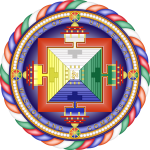FPMT Basic Program at Chandrakirti Meditation Centre
The FPMT Basic Program in Buddhist Studies of Sutra and Tantra (BP) is a five-year, twelve-subject course of studies designed by Lama Zopa Rinpoche. It provides a practice-oriented transmission of the Buddhadharma to committed students ready to progress to in-depth study and practice.
Some of Tibetan Buddhism’s most treasured texts form the heart of the program. Je Tsongkhapa’s Middle Length Lamrim; Shantideva’s Bodhisattvacharyavatara; the Heart Sutra; Jetsun Chokyi Gyaltsen’s Tenets; Maitreya’s Ornament for Clear Realization and Tathagata Essence; the Wheel of Sharp Weapons, and other texts guide the practitioner through a comprehensive study of sutra and tantra.
The program’s comprehensive curriculum greatly enhances students’ Dharma understanding, establishing a sound basis for ongoing study, practice, retreat, and service.
The FPMT Basic Program at Chandrakirti Centre is taught by resident teacher Geshe Jampa Tharchin and discussion groups led by senior students. Study of the standard texts and commentaries is supported by discussions, meditations, reading and homework assignments, short retreats, and each subject is completed with a test or presentation to the class.
Geshe Tharchin completed one round of the 12 BP subjects at Chandrakirti Centre from 2016 – 2023 and has now started the second round beginning with Je Tsongkhapa’s Middle Length Lamrim on Wednesday evenings from 7pm, plus teaching weekends. Sign up by emailing meditate@chandrakirti.co.nz.
Students may enter the program at the beginning of subjects as indicated on our calendar of events and can attend teaching weekends at any time.
“What distinguishes it [the Lamrim]… is its scope and clarity. It expounds the entire path from the way one should rely on a spiritual teacher, which is the very root, right up to the attainment of buddhahood, which is the final fruit. The various stages of the path are presented so clearly and systematically that they can be easily understood and are inspiring to put into practice.” His Holiness Dalai Lama
Students will benefit most from their BP studies if they have some familiarity with preparatory study and practice as offered by foundational-level programs.
Over the course of their engagement with the BP students must follow the BP Conduct and Practice Criteria: practicing to the best of their ability to refrain from killing, stealing, lying, sexual misconduct (adultery), and intoxicants, while developing awareness of positive and negative states of mind, and, in particular, the practice of patience and concern for others.
In line with Lama Zopa Rinpoche’s advice, all students are also recommended to make merit through taking part in regular service to the program and the centre in general, and to make their study time joyful and beneficial by applying the teachings to their meditations and behaviour. Students are often able to stay on-site and involve themselves in all the other spiritual practices of the centre.
“The most important thing is the continuity of developing your mind in the lamrim, the stages of the path to enlightenment. It doesn’t matter if you are in Africa, Tibet, on the moon, in Iraq or wherever, whether you are rich or poor continue to develop your mind in the Lamrim. That is the most important thing.
Learning Dharma means less ignorance and more wisdom. It means more light in your life, no darkness in your mind. It means you have more freedom in your life to achieve liberation from samsara and great enlightenment. The more you understand Dharma, the more you can benefit others.”–Lama Zopa Rinpoche

The FPMT Basic Program Subjects
The BP curriculum was designed by Lama Zopa Rinpoche to ensure that students who want to study beyond the foundational level will gain a profound knowledge of the key aspects of the entire Buddhist path.
The BP curriculum includes the study of:
-
- Stages of the Path: the stages of the path to enlightenment of beings of low, middling, and great capacity
- Heart Sutra: emptiness and the phenomena qualified by it
- Mahayana Mind Training: Wheel of Sharp Weapons: the law of actions and results, or karma, and the states of mind that shape our future experiences
- Engaging in the Bodhisattva Deeds: the six perfections—generosity, morality, patience, joyous effort, concentration, and wisdom—and how to practice them in everyday life
- Mind and Cognition: the way the mind knows phenomena and the mental factors that constitute the basis of our daily experience
- Tenets: the philosophical systems, or tenets, of the four main schools of ancient Buddhist thought
- Ornament for Clear Realization and Seventy Topics: the 173 aspects of the omniscient mind and the practices that enable to achieve them
- The Tathagata Essence: the buddha lineage or tathagata essence that exists within every sentient being
- Grounds and Paths of Secret Mantra: the four classes of tantra with emphasis on the generation and completion stages of highest yoga tantra
- The Three Basic Bodies – Death, Intermediate State and Rebirth;
- and a Highest Yoga Tantra Commentary:
The FPMT Basic Program Subject Descriptions offer a more detailed description of each of these subjects.
When at least the nine subjects of the core curriculum are completed, students may participate in the review and final exam. Three months of lamrim retreat complete the program. The retreat may be done before or after the final exam, but should preferably be done after studying Stages of the Path. Lama Zopa Rinpoche strongly encourages students to do the three-month retreat all at once, but if this is not possible, three separate months of lamrim retreat fulfill the requirement.
“Proper guru devotion – correct devotion to your virtuous friends – allows you to actualize successfully all the steps of the path to enlightenment, from the perfect human rebirth up to buddhahood itself.”—Lama Zopa Rinpoche


